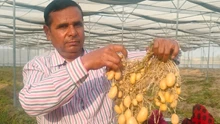
Between April and July this year, the Maharashtra State Agricultural Marketing Board plans to treat almost 2,000 tonnes of mangoes in its Vashi plant for export. According to Bhaskar Patil, DGM, Vapour Heat Treatment and Irradiation Facility Centre (CHT and IFC), the export season looks optimistic.
The MSAMB's export facility at Vashi, which is near the Agricultural Produce Marketing Committee (APMC), offers the essential infrastructure for exporters to deliver their fruits to overseas destinations. Before fruit is exported to the United States or Australia, it must be irradiated and treated with hot water, whereas Japan and South Korea require that the export consignment be treated with vapour before flying out of the home nation. For the convenience of exporters, Vashi's centre provides all three treatment facilities.
Due to the relaxation of all Covid-19 limitations, Indian exporters are gearing up for a healthy export season after a two-year hiatus. Meanwhile, after two years, the US inspector has arrived, allowing the fruits to be flown to the United States. Dr. Kathryn Fielder, a foreign programme expert with the United States Department of Agriculture (USDA), came on April 7 and will be in the country until June 13 to oversee the procedure. She told The Indian Express that she is required by law to conduct randomised inspections of consignments to look for fruit fly and fruit stone weevil, among other things. "Any shipment that reports one of these bugs will be refused," she explained.
She added that Indian mangoes are not allowed on Hawaii's island station for fear of contaminating the native flora. The programme is being held as a result of the two countries' mutual collaboration. Patil and other Board members also stated that from next year, the US government will authorise inspectors from the National Plant Protection Office (NPPO) to monitor the procedure, therefore expanding the export window. Countries like as South Korea and Japan have already given NPPO permission to observe the treatment process and have ceased sending inspectors to India.
According to Patil, 100 tonnes of mangoes have been processed at the hot water and irradiation centre for sale to the United States, while 10 tonnes have been provided to Australia. Similarly, at the hot water treatment facility, 40 tonnes were treated for the European Union, and at the vapour heat treatment plant, 12 tonnes were processed for Japan. In all, roughly 250 tonnes of fruit have been treated for various nations to far.
The plant, which is now fully operational, is planned to process 2,000 tonnes of fruit for export. Over 1,000 tonnes will be sent to the United States, with the remainder going to other countries. The MSAMB is projected to collect Rs 5 crore in fees, while the centre is likely to gain Rs 145 crore in fees.










